CTP Episode of the Day - 10.31.06 - Orison
Today's Cherished Episode: Orison (7x07)
Original Air Date: January 9, 2000
Written By: Chip Johanessen
Directed By: Rob Bowman
Scully's sense of right and wrong are put to the test as the agents track down an escaped Donnie Pfaster.
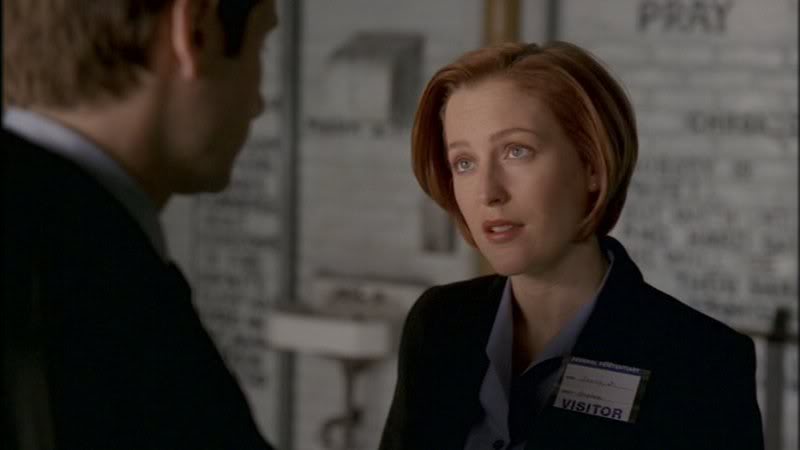
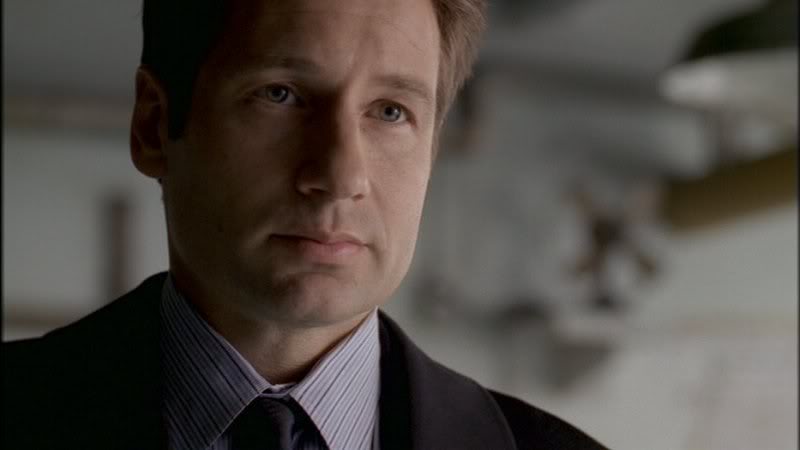
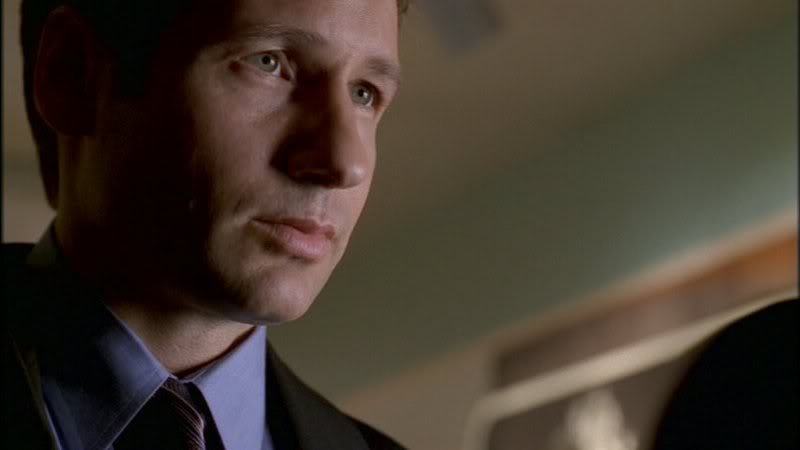
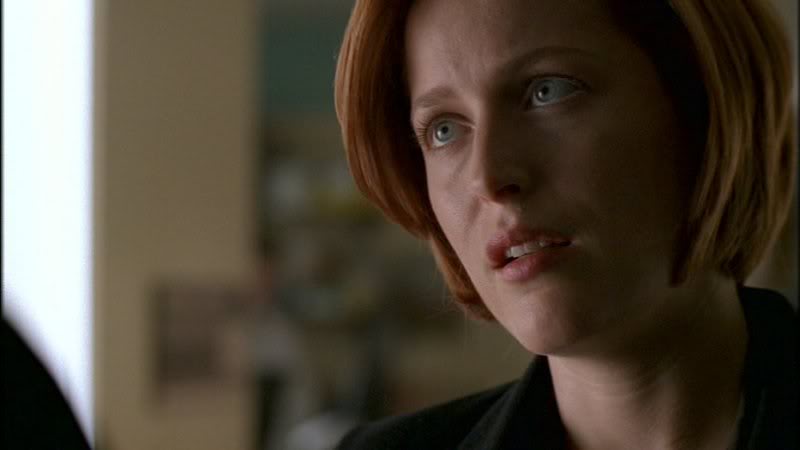
"Who does your nails, girly girl?"
Some "Orison" Tidbits & Musings:
-- The episode title, "Orison," was the name of the preacher and the word also means "a prayer."
-- Two of the most memorable X-Files episodes, "Beyond the Sea" and "Irresistible," had one thing in common. They both featured a psychologically tormented Scully in a torturous cat-and-mouse emotional game with the personification of pure evil. Those episodes were the stuff of pure, primordial horror and the idea was most certainly worth visiting again. But the road to "Orison" would not be a smooth one.
-- Chip Johanessen, who had been an executive producer on Millennium, had an idea about a prisoner with the ability to stop time. An intriguing secondary story involved the strange effect this prisoner would have on Scully through a mysterious song from her childhood. Carter, Spotnitz, and Shiban immediately saw the possibilities in "Orison." For Carter, it was the eerie similarity to "Beyond the Sea" that was appealing.
-- After reading Johanessen's original draft of the script, Carter and Spotnitz came up with the idea of bringing back Donnie Pfaster, the nail and hair fetishist and serial killer from the Season 2 episode "Irresistible." Carter said, "We had talked about possibly revisiting some old monsters in Season 7, and this seemed like the perfect opportunity. We knew that Donnie had some history with Scully from 'Irresistible' and that bringing him back would set up all sorts of possibilities with Scully."
-- Spotnitz was likewise enthused at the idea of bringing an old X-Files nemesis back. "For me, what really justified bringing Donnie back was the final act of the script when Donnie comes for Scully and she ends up shooting him full of holes. Once we decided to bring Donnie back, we all started to get excited by the script."
-- John Shiban related that one of the key decisions around this time was to make Donnie Pfaster bigger than life. "We decided late in the process to turn him into this totally demonic character, essentially evil as an entity."
-- Casting "Orison" was both easy and difficult. Easy because Nick Chinlund, whose intensity as Pfaster had helped make "Irresistible" a standout episode, was naturally brought back. But finding the right actor to portray the dual nature of Orison was a tougher task. Casting director Rick Millikan finally settled on veteran character actor Scott Wilson.
-- On the production side, "Orison" shaped up as one of the most physically and visually demanding stand-alone episodes of the season. Stunt coordinator Danny Weselis took one look at the stunt list, which had the stunt people being tossed through mirrors and bodies bouncing off moving cars, and proclaimed "Orison" "the most violent show I had done in two years."
-- Rob Bowman was brought in for what would be one of only two episodes he would direct in Season 7. His first piece of homework was to revisit "Irresistible" and reacquaint himself with the haunting rhythms of the death fetishist and, in particular, the psychological interaction between Pfaster and Scully. ("Irresistible" was directed by David Nutter.)
-- Spotnitz remembered that going back to the original Pfaster story was integral to giving "Orison" a substantial new direction. "The problem with doing this was that 90 percent of the good stuff was done the first time in 'Irresistible.' That story was terrifying and scary. It was going to be tough to compete with that. But what the script for 'Orison' was giving us was another bad guy who was attempting to serve God by liberating prisoners and then killing them. We also knew the intensity between Scully and Pfaster would be deeper and more involved. And that it would end up taking Scully someplace she had never been before."
-- Anderson had long ago proclaimed "Irresistible" one of her all-time favorite episodes. But reuniting with actor Chinlund and the Donnie Pfaster character brought back memories. "Working with Nick Chinlund again was freaky. I had almost forgotten how intense he was."
-- Easily one of the most technically complex sequences in the episode was the opening scene in which Pfaster stopped time and walked out of the prison. Bowman shot multiple takes using different film speeds. The most challenging element of the scene fell to actor Chinlund, who had to zigzag around actors with the aid of a motion control camera. Bowman blocked out numerous actors who would be composited digitally into the scene in postproduction.
-- That scenes ended with Donnie walking straight into the camera, exactly as he did in the teaser of "Irresistible."
-- The song from her childhood that haunted Scully, "Don't Look Any Further," was a minor classic of sorts, originally recorded by the Temptations and covered by a half dozen other performers. Unfortunately, what producer Paul Rabwin found when he went looking for just the right version for the episode was "that none of them really worked."
-- Rabwin added, "We felt we needed someone to record an original version of the song. We approached Lyle Lovett but he wasn't available. But a lot of us admired singer-songwriter John Hiatt and so we called him. He was really up for it and he sent us a demo of the song. It was chilling, eerie, and soulful. It was perfect."
-- Chris Carter came up with the idea of having Scully's bedside clock read 666. (Revelations 13:18 -- Here is wisdom. Let him that hath understanding count the number of the beast; for it is the number of a man, and his number is Six hundred threescore and six.)
-- I always assumed it was an "oopsie" that all the lights in Scully's apartment came on when the power was restored -- even though they weren't on before the power went off -- but this direction is actually in the original script -- "all the lights inexplicably come on."
-- Among the words scrawled on the prison chapel's walls was the phrase "Sheep go to Heven (sp.), Goats go to Hell." This was the chorus line of the song "Sheep go to Heaven" by the band Cake -- one of Gillian Anderson's favorite bands.
-- In the original script, after Mulder told Scully it was okay to walk away from the case, he added, "You got nothing to prove to me."
-- Oopsie? Mulder told Scully that no one remembered anything about the prisoner's escape, and that for awhile, no one knew Pfaster was gone. So how did Mulder know that the escape took place exactly at 6:06 a.m.?
-- The Season 7 DVD's include a short deleted scene from the episode where Scully hypothesizes about prison life. It followed Mulder's line that the escaped prisoners were never seen again.
-- Mulder says that Mesmer was able to hypnotize and command entire audiences. Mesmer is Anton Mesmer, an 18th century Austrian physician who sought to treat disease through animal magnetism, an early therapeutic application of hypnosis. The term "mesmerism" means to enthrall, spellbind, or hypnotize.
-- Scully's nicknames seem to come from great literature. "Scout" most likely comes from To Kill a Mockingbird, a story about the summer another little girl leaned there was evil in the world. And of course her father called her "Starbuck" from Moby Dick.
-- The most frightening thing in this episode may have been Nick Chinlund in his tighty whities and blue slippers.
-- Orison's quote to Donnie, "Whosoever sheddeth man's blood, by man shall his blood be shed," is from Genesis 9:6 during God's covenant with Noah.
-- The original script contained an additional exchange between Pfaster and Orison after Orison told Donnie "the wicked will be punished." Donnie: "You won't shoot me. Lord says no murderer has eternal life. We're lost causes, you and me." Orison: "No. The Lord is my Shepherd ..." Donnie: "You think you're His avenging angel. That He'll take you back." Orison: "The Lord forgives the sinner. He loves the righteous man." Donnie: "Pull the trigger, Reverend. Then ask yourself who's in your heart."
-- The "Orison" demon was a classic example of recycling at its finest. Effects man John Vulich wanted to pay homage to the makeup design of "Irresistible." While waiting for the official makeup shots from that episode's makeup man, Toby Lindala, to show up, Vulich turned to X-Files fan sites on the Internet and found a number of photos he was able to use as models to get started. One of Vulich's employees, Brian Blair, was the perfect fit for actor Nick Chinlund, and so served as the demonic stand-in for the actor.
-- The scene in which Mulder and Scully discuss the case at the three gravesites was slightly different in the original script than in the finished product. In the original script, the scene starts with Scully telling Mulder she owed him an apology, to which Mulder replied, "Maybe killing those prisoners was the Reverend's penance for his own crimes. His way of evening the score with God." The script indicates that the freshest grave (Orison's) has the words "Don't Look Any Further" written in the dirt. Then Scully said: "Occam's Razor. Take every possibility and choose the simplest one. This wasn't a sign for me. This was me trying to convince myself of some greater significance." Mulder: "Just like Reverend Orison."
-- In the episode, Scully said that Pfaster placed the call that lead the police to Orison's body, almost "begging us to hunt him down," but that line does not appear in the original script. In the original script, when Orison's body is unearthed, Scully walked away from the gravesite and Mulder followed. Mulder: "I'm not giving you a choice. We're going home. There's nothing else for us to do here. We've done all we can. Let the marshals bring this man in." Scully: "You're right. We shouldn't look any further."
-- No matter whether you follow the dialogue in the original script or the episode, I believe it was a bit out of character (and strictly plot device) for Mulder and Scully to decide their work was done after they found Orison dead. Mulder said in the episode it was because the "X-File" aspect of the case was over, and in the original script his reason was more emotional, but surely these two knew better than anyone how important it was to catch Pfaster. Even if all signs were telling them not to look any further, I had trouble believing they would just go home. (Pfaster could just have easily attacked Scully in a motel room in Illinois, but I suppose that would have lacked the emotional impact of her being attacked in her own home.)
-- The original script indicated that Scully changed from her work clothes into a "flannel nightgown." This made me question whether Chip Johanessen had ever *seen* The X-Files. < g >
-- In "Orison," we learned that Mulder had a bathroom (though it didn't seem to be in the same place as it was in "all things").
-- For those in the shallow end of the pool, the original script also said that Mulder was brushing his teeth "in just his tee-shirt and boxers." Damn those pajama bottoms! < g >
-- Although the script said "night" and Mulder's clock read 10:06 (p.m., we assumed), Mulder and Scully seemed to be heading to bed in the middle of the day. There was a significant amount of light filtering through Scully's window during the entire fourth act.
-- A definite X-file in this episode was why on earth Scully had so many candles in her apartment. She was either planning for a major blackout or perhaps a romantic tête-à-tête with Mulder. I'll choose door number two, Monty.
-- The fight between Scully and Pfaster in Scully's apartment was a knockdown-dragout sequence that took a day and a half to film. Stunt doubles for Anderson and Chinlund took the hardest hits, but Anderson recalled that she came by her many bumps and bruises honestly. "I had to crawl under the bed with my legs and hands tied," remembered Anderson. "It was take after take of having to crawl like a worm. I got bruised and swollen."
-- Set costume designer Nancy Collini reported that Gillian Anderson required ten pairs of pajamas for her fight sequence.
-- The bottle of Scully's shampoo that Donnie picked up was Willow Lake, made by the Lamour Corporation in Minneapolis.
-- The ending slow motion scenes between Scully, Pfaster, and Mulder look eerily similar to the scenes toward the end of The Matrix (when Mr. Smith shoots Neo) -- including the flash as the gun goes off being reflected on a character's face, a spent cartridge falling to the ground, the gun going off in slow motion, etc.
-- The original script said that Mulder screamed something at Donnie, and yelled at him to put his hands in the air, but that "sound is absent." Excellent lip readers agree that Mulder said, "Put your hands up!", "Put 'em up!". Then when Mulder saw Scully, some believe Mulder said, "Don't shoot." But I think it's extremely clear that when Mulder saw Scully, he yelled, "Did he hurt you?" And Scully replied, "Yes."
-- The original script described Scully's action as follows: "Intensity in her eyes. Great intention warring with great restraint. Morality and religion and all that is right and wrong warring with some kind of deep, primitive, natural sense of law. Struggling, emotional, waiting for a sign. Resume Donnie, staring at her, when a smile begins to form on his face. And then everything goes BLACK. Over which we hear: MUSIC speeding up, as we heard earlier, at the top of Act One. Faster and faster. It is as if we are traveling into some other kind of speed warp. That is only shattered by a loud GUNSHOT."
-- My biased opinion was that Scully only fired one shot that passed through Pfaster and shattered the overhead light.
-- The original version of the "Orison" script that I have does not include the final scene between Mulder and Scully. It only mentions that there will be a scene in Scully's bedroom, "sitting on her bed, talking about evil, the devil, and don't look any further." Ultimately, there were several different versions of that final scene written, and though I no longer have the script differences, I do recall that one included a little more discussion and speculation as to why Scully did what she did, and how Mulder's experience with having God speak to him (through the song on the radio) affected him. Another version of the scene included Mulder holding Scully at the end, which I thought would have made a great parallel back to the episode ending hug in "Irresistible." That hug happened when the two characters were so young and innocent, and a hug to end "Orison" would have been between two very different people, who had seen and suffered so much, and who were in a totally different relationship than they were five years earlier. I wish they had left the hug in.
-- Donnie Pfaster was evil and most assuredly would have killed again, and based on the circumstances, Scully might have been cleared for her role in shooting him. But when all was said and done, Scully basically committed murder, Mulder told her he was covering it up, and through her silence, she agreed to that course of action. Was this true to a character who argued for a serial killer to receive a life sentence rather than the death penalty? No. But the writers basically painted themselves into a corner where cover-up was the only way out. However, the Good Catholic Girl did consider the extreme possibility that it was God at work within her, but she also considered the extreme possibility that it wasn't. Her faith, her morals, her values, her sense of right and wrong all converged at this one point in time. This occurrence could and should have weighed heavily on her conscience and her spirit for a long time, but in usual X-Files fashion, it would never be brought up again. As Mulder said, "Case closed."
-- Nick Chinlund and David Duchovny had crossed paths once before The X-Files when the actor appeared in an episode of the erotic anthology series Red Shoe Diaries, which was hosted by Duchovny.
-- Scott Wilson's acting resume included the films In the Heat of the Night, In Cold Blood, The Great Gatsby, The Right Stuff, The Ninth Configuration, and The Exorcist III.
-- Lisa Kushell (Call Girl) was a regular on the third season of Fox's Mad TV.
-- Emilio Rivera (Brigham) recently appeared in Bones and Shark and appeared in the 2005 version of Fun With Dick and Jane with Tea Leoni.
-- Once & Future Retreads: In addition to Nick Chinlund (Donnie Pfaster), Steve Rankin (U.S. Marshal Daddo) played a Dallas area Field Agent in Fight the Future. (He brought Mulder and Scully the bones when they flew back to Dallas.)
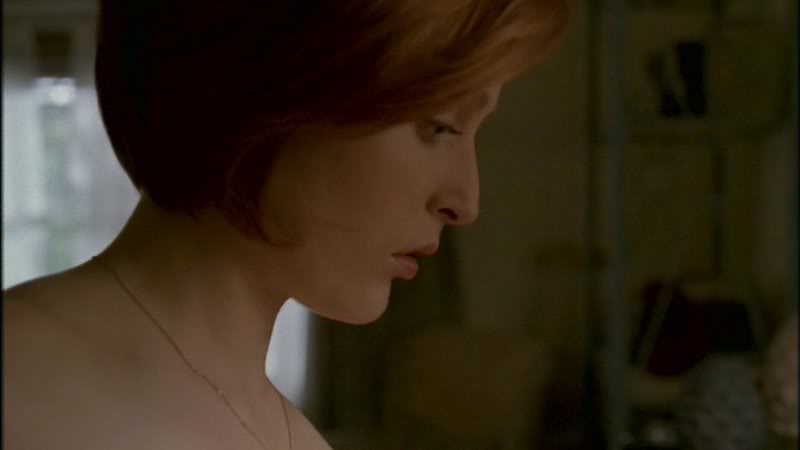
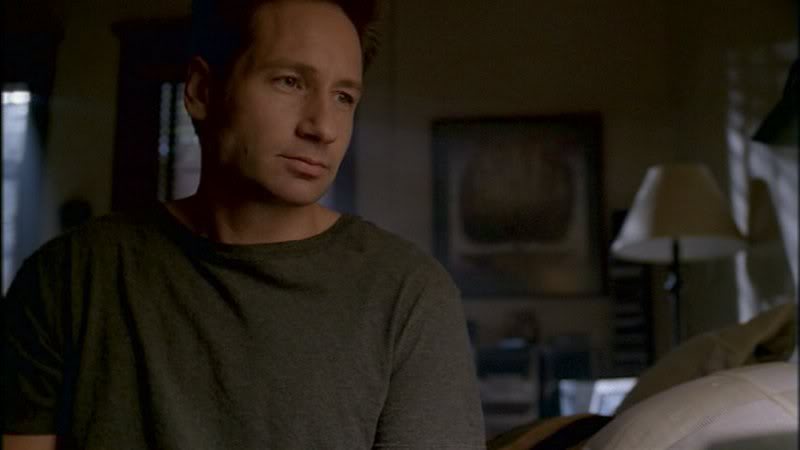
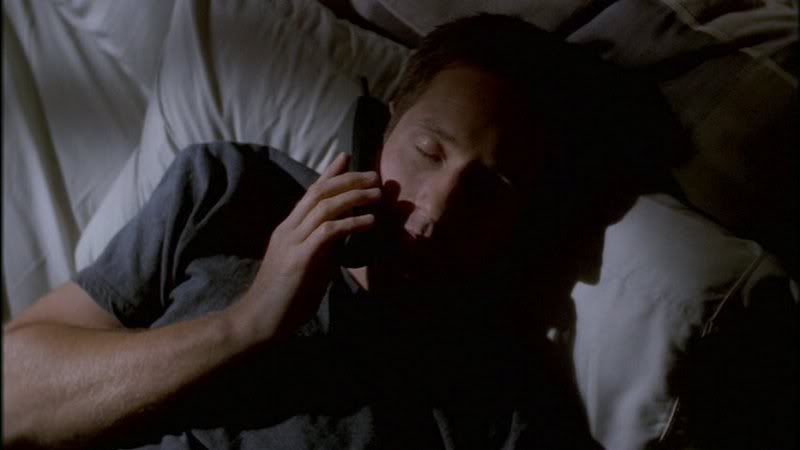
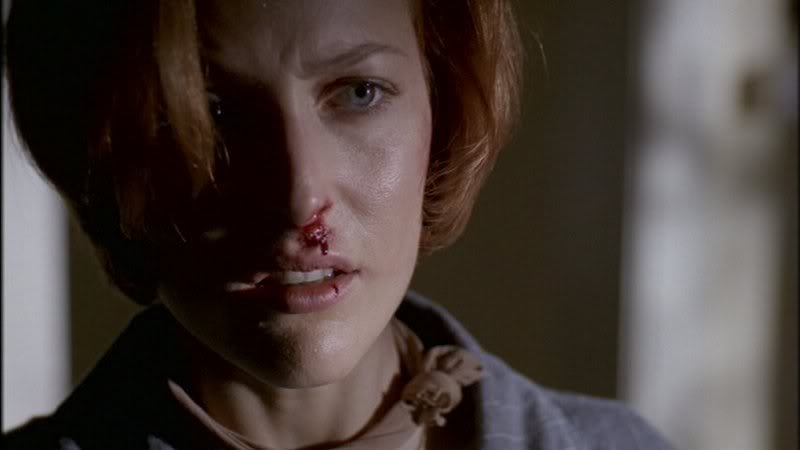
(Thanks to chrisnu for today's pics.)
Please share your first impressions, favorite (or cringe-worthy) moments, classic lines, favorite fanfic, nagging questions, repeated viewing observations, etc., as today we celebrate "Orison."
Polly